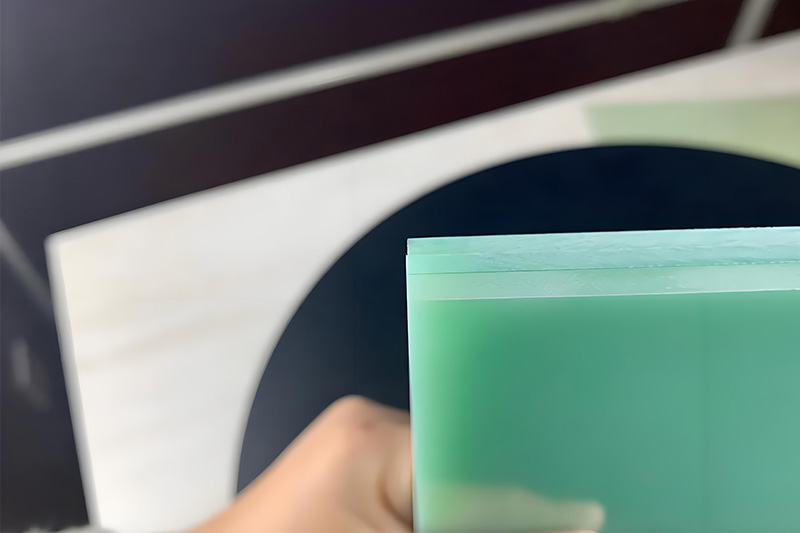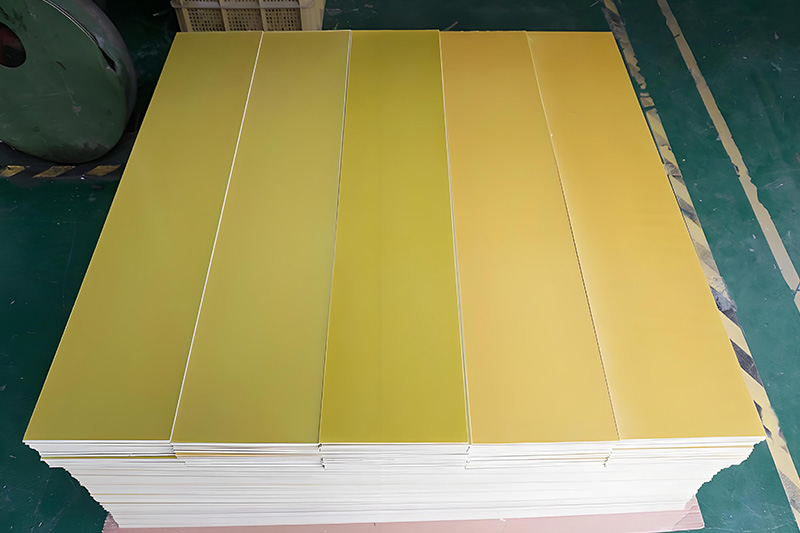FR4 epoxy sheet is a high-performance composite material. With its unique material properties and structural design, FR4 enables multi-dimensional performance enhancements in transformer applications—including improved thermal conductivity, electrical insulation, mechanical support, and process adaptability.
FR4 is composed of woven fiberglass cloth reinforced with epoxy resin. This structure creates an efficient thermal conduction network: the fiberglass serves as a rigid, thermally conductive framework, while the epoxy resin acts as the filler medium. Together, they form continuous vertical heat transfer pathways, allowing rapid dissipation of heat from within the transformer and effectively controlling localized temperature rise.
The coefficient of thermal expansion (CTE) of FR4 closely matches that of transformer metal components. This compatibility ensures synchronized deformation during temperature fluctuations, minimizing the formation of thermal stress-induced gaps at interfaces. As a result, the continuity of thermal conduction paths is maintained, ensuring consistent heat dissipation performance.
FR4 epoxy sheets are often used as thermal support components in transformer design. By machining ventilation holes or cooling channels, FR4 can work in conjunction with forced-air systems to form efficient convection paths. In addition, high thermal conductivity coatings can be applied to the material surface, further enhancing heat dissipation under high-temperature operating conditions.

FR4 material maintains stable insulation properties under both normal and humid conditions. This ensures effective electrical isolation between windings and the transformer core, as well as between windings of different potentials, reducing the risk of leakage currents and partial discharge. It fully meets the insulation requirements of high-voltage transformers.
FR4 exhibits low dielectric loss tangent and dielectric constant under high-frequency conditions. These properties help reduce energy loss caused by dielectric polarization, thereby improving power conversion efficiency in applications such as renewable energy systems and high-frequency power supplies.
FR4 demonstrates outstanding arc resistance in high-voltage circuits. In the event of overvoltage or short-circuit-induced arcing, the material maintains its structural and insulating integrity, preventing insulation breakdown and minimizing the risk of fire.
FR4 sheets possess excellent flexural and impact strength. This allows them to withstand mechanical vibration and shock during transportation, installation, and operation of transformers. As a result, they help prevent winding deformation and core displacement, ensuring stable insulation spacing.
FR4 exhibits minimal dimensional change in high-temperature, high-humidity, or cyclic thermal environments. This stability ensures that even in regions with large day–night temperature differences or high humidity, the transformer remains structurally reliable, reducing the risk of winding short circuits due to material expansion or contraction.
With its low density, FR4 is significantly lighter than many traditional insulation materials. In dry-type transformer design, using FR4 helps reduce overall weight, making installation and maintenance easier while also lowering transportation costs.

FR4 sheets can be processed with high precision by CNC machine tools, which can meet the tolerance requirements of precision parts such as winding skeletons and insulating partitions. Its processing surface has high precision and can be closely matched with metal parts to avoid partial discharge caused by gaps.
FR4 epoxy sheets meet high flame retardant grade standards. They can extinguish themselves when burning, and the smoke release is low. In crowded scenes, this feature can delay the spread of fire and buy time for emergency treatment.
FR4 materials are highly corrosion-resistant and can resist corrosion from most chemical substances. It can operate stably for a long time in harsh environments such as humidity, salt spray, and oil immersion, effectively extending the maintenance cycle of transformers.
FR4 epoxy sheets play a key role in optimizing the thermoelectric performance of transformers through the combination of material properties and engineering design. From the construction of heat conduction paths to electrical insulation guarantees, from mechanical support design to full environmental adaptation, its comprehensive performance has laid the foundation for the efficient and intelligent development of power equipment. In the future, with the application of nano-composite technology, the performance of this material is expected to achieve further breakthroughs.
If you need our products please write down any questions, we will reply as soon as possible.
There are three ISO certificates for quality certification. The certificates will be shown later. ISO
After receiving the advance payment, the production cycle is 15-25 days. And the transportation cycle should be calcul……
We supply with installation guide and user manual for each transformer. If you do not understand them. We will offer v……